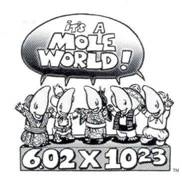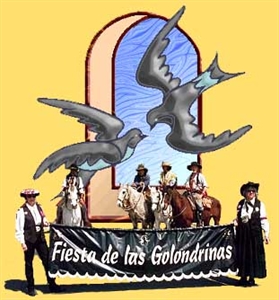Diwali Day 2024 is on Wednesday, October 23, 2024: What is Diwali
Wednesday, October 23, 2024 is Diwali Day 2024.
As an Amazon Associate I earn from qualifying purchases.
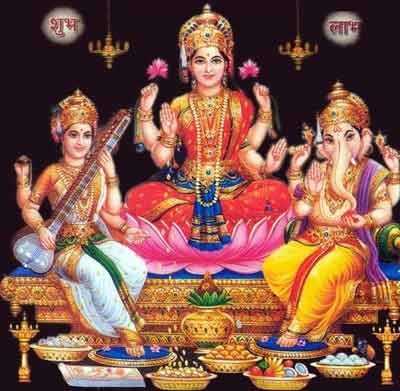
Diwali is a five day Hindu festival which occurs on the fifteenth day of Kartika. Diwali means "rows of lighted lamps" and the celebration is often referred to as the Festival of Lights. During this time, homes are thoroughly cleaned and windows are opened to welcome Laksmi, goddess of wealth. Candles and lamps are lit as a greeting to Laksmi. Gifts are exchanged and festive meals are prepared during Diwali. The celebration means as much to Hindus as Christmas does to Christians.
Because there are many regions in India, there are many manifestations of the Diwali festival. In at least one area, the festival begins with Dhanteras, a day set aside to worship Laksmi. In the Indian culture, wealth is not viewed as a corruptive power. Instead, a wealthy person is considered to have been rewarded for good deeds of a past life.
On the second day Kali, the goddess of Strength, is worshipped. This day also focuses on abolishing laziness and evil.
On the third day (the last day of the year in the lunar calendar), lamps are lighted and shine brightly in every home. The lamp symbolizes knowledge and encourages reflection upon the purpose of each day in the festival. The goal is to remember the purpose throughout the year.
The fourth day of Diwali falls on the first day of the lunar New Year. At this time, old business accounts are settled and new books are opened. The books are worshipped in a special ceremony and participants are encouraged to remove anger, hate, and jealousy from their lives.
On the final day (Balipratipada) of the festival, Bali, an ancient Indian king, is recalled. Bali destroyed the centuries old philosophies of the society. However, in addition to this, he is remembered for being a generous person. Thus, the focus of this day is to see the good in others, including enemies.
Because there is no one universally accepted Hindu calendar, this holiday may be celebrated on a different date in some parts of India, but it always falls in the months of October or November.
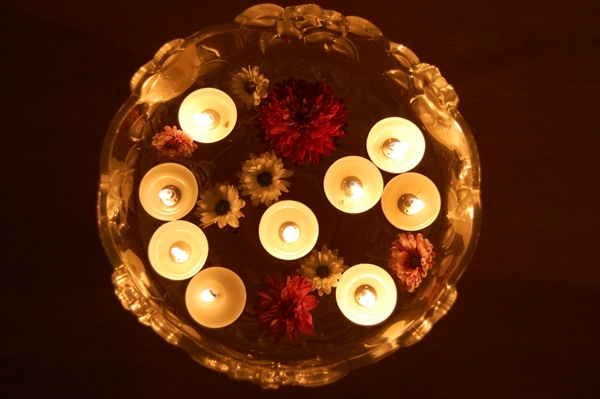
What is Diwali?
About Diwali Celebrations:
Diwali is the festival of lights and is celebrated with great enthusiasm by all Indians all over the world. The uniqueness of this festival is its harmony of five varied philosophies, with each day to a special thought or ideal. In a country, which is known for its celebratory fervor, grand Diwali celebrations should not be a matter of surprise for anyone. A typical celebration of Diwali in India includes fresh flowers, exchanging of Diwali gifts, new clothes, meeting new and old friends, sending Diwali cards embellished with beautiful Diwali pictures to loved ones, conveying the best Diwali greetings and offering traditional Diwali sweets to each other.
In fact the Diwali celebrations begins from Dusshera, which comes about twenty days before Diwlai. The splendor of Diwali is so great that even countries like Singapore, Thailand and Malaysia have come up with their own ways of Diwali celebrations.
'Festival of Lights' or Diwali is a festival which has the potential of unifying entire India because of the charisma and splendor surrounding this festival. Diwali has been given the traditional name of 'festival of lights' because of the hundreds and thousands of small oil lamps or diyas lighted by many households. The burning of these diyas are considered to be the lighted pathway of a person's expression of happiness and also a manner of paying obeisance to God, the Supreme power for attainment of health, prosperity, knowledge, financial security and peace in one's life.
About Diwali (Festival of Lights)
'The festival of lights' is celebrated with much enthusiasm and zeal in all of north India. In fact the festival of Diwali is regarded to bring the supernatural joy and brightness in a person's life with the hope of discovering light amidst darkness, achieving happiness in place of ignorance and spreading of love amidst hatred and violence. The tradition of lighting the diyas on Diwali holds much importance as in Hindu mythology the light signifies goodness and vitality. In cities candles and classy neon lights often substitute these diyas.
Customs & Traditions
(5 day celebration...reasons/stories behind it)
Diwali, which leads us into truth and light, is celebrated on a nationwide scale. It symbolises that age-old culture of our country, which teaches us to vanquish ignorance that subdues humanity and to drive away darkness that engulfs the light of knowledge. Diwali, the festival of lights even today in this modern world projects the rich and glorious past of our country and teaches us to uphold the true values of life. It is associated with many customs and traditions. One of the most curious customs, which characterises this festival of Diwali, is the indulgence of gambling, especially on a large scale in North India. It is believed that goddess Parvati played dice with her husband, Lord Shiv on this day and she decreed that whosoever gambled on Diwali night would prosper throughout the ensuring year. This tradition of playing cards- flash and rummy with stakes on this particular day continues even to day.
The first day of five daylong Diwali celebrations is of great importance to the rich community of western India. Houses and business premises are renovated and decorated. Entrances are made colorful with lovely traditional motifs of Rangoli designs to welcome Lakshmi, the Goddess of wealth and prosperity. To indicate her long-awaited arrival, small footprints are drawn with rice flour and vermilion powder all over the houses. Lamps are kept burning all through the night. Believing this day to be auspicious women purchase some gold or silver or at least one or two new utensils.
Lakshmi Puja is performed in the evenings when tiny diyas of clay are lighted to drive away the shadows of evil spirits, devotional songs- in praise of Goddess Laxmi are sung and Naivedya of traditional sweets is offered to the Goddess. There is a peculiar custom in Maharashtra to lightly pound dry coriander seeds with jaggery and offer as Naivedya In villages cattle are adorned and worshipped by farmers as they form the main source of their income. In south cows are offered special veneration as they are supposed to be the incarnation of Goddess Laxmi and therefore they are adorned and worshipped on this day .
On second day there is a traditional practice of taking bath before sunrise with oil and "Uptan" (paste) of gram flour and fragrant powders. In northern India, especially in places like Punjab, Diwali is dedicated to the worship of Lord Rama. While in Bengal, Kali/Durga, the goddess of strength, is worshipped. This reverence is called "Kali Chaudas or Kal Chaturdasi". It is believed that on this day Kali killed the wicked Raktavija. Lord Ganesha, the elephant-headed god, the symbol of auspiciousness and wisdom, is also worshipped in most Hindu homes on this day. Diwali is one of the few Hindu festivals, which is celebrated in every part of the country, even in states like Kerala that has Onam as its main festival. To the Jains, Deepavali has an added significance to the great event of Mahaveera attaining the Eternal Bliss of Nirvaana. The passing into Eternity on the same Amavasya of Swami Dayananda Saraswati, that leonine sanyasin who was one of the first to light the torch of Hindu Renaissance during the last century, and of Swami Ramatirtha who carried the fragrance of the spiritual message of Hindu Dharma to the western world, have brought the national-cum-spiritual tradition of Deepavali right up to modern times.
Govardhan-Puja is also performed in the North on the fourth day. This day is also observed as Annakoot meaning 'mountain of food'. In temples especially in Mathura and Nathadwara, the deities are given milk bath and dressed in shining attires with ornaments of dazzling diamonds, pearls, rubies and other precious stones. After the prayers and traditional worship innumerable varieties of delicious sweets are offered to the deities as "Bhog" and then the devotees approach and take Prasad. Goddess Lakshmi is worshipped in every Hindu household. In many Hindu homes it is a custom for the wife to put the red tilak on the forehead of her husband, garland him and do his "Aarathi" with a prayer for his long life. In appreciation of all the tender care that the wife showers on him, the husband gives her a costly gift. This Gudi Padwa is symbolic of love and devotion between the wife and husband. On this day newly married daughters with their husbands are invited for special meals and given presents. Diwali celebration is a very happy occasion for all.
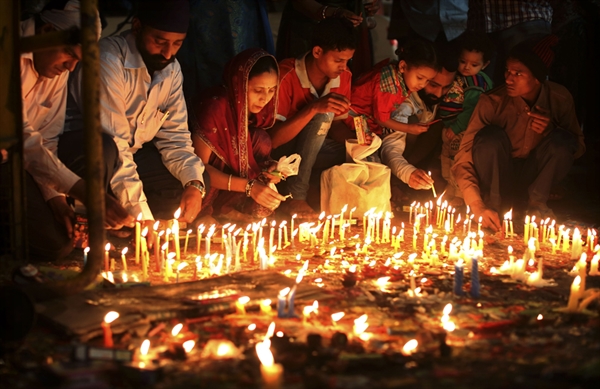
why do we celebrate diwali?
Diwali or Deepavali (Hindi: दीपावली, दिवाली; Kannada: ದೀಪಾವಳಿ; Urdu: دیوالی; Tamil: தீபாவளி; Telugu: దీపావళి; Marathi and Konkani:दिवाळी) is a significant festival in Hinduism, Buddhism, Sikhism, and Jainism, and an official holiday in India.[1]
Adherents of these religions celebrate Deepavali as the Festival of Lights. They light diyas—cotton string wicks inserted in small clay pots filled with oil—to signify victory of good over the evil within an individual.
As per Hindu calendar, the five day festival of Deepavali is centered on the new moon day that ends the month of Ashwin and begins the month of Kartika, beginning on the 13th day of the dark half of Ashwin (Ashwin 28th) and ending on the 2nd day of the bright half of Kartika (Kartika 2nd). The main day of celebration varies regionally.[2][3][4]
Deepavali is a Sanskrit word[5][6][7] - Deepa meaning light and Avali, meaning a row.[8][9] It means a row of lights and indeed illumination forms its main attraction. It symbolises that age-old culture of India which teaches us to vanquish ignorance that subdues humanity and to drive away darkness that engulfs the light of knowledge. Deepavali, the festival of lights even to-day in this modern world, projects the rich and glorious past and teaches us to uphold the true values of life.
In Hinduism, across many parts of India and Nepal, it is the homecoming of Rama after a 14-year exile in the forest and his victory over Ravana.[10] In the legend, the people of Ayodhya (the capital of his kingdom) welcomed Rama by lighting rows (avali) of lamps (dĭpa), thus its name: dīpāwali. Over time, this word transformed into Deepavali in Hindi and Dipawali in Nepali, but still retained its original form in South and East Indian Languages. In Dravidian languages it is called as Deepavali and the same is used in Malaysia and Singapore. South Indians never say Diwali as it means Firebucket.
In Jainism, Deepavali marks the attainment of nirvana by Mahavira on 15 October, 527 BC.
Deepavali has been significant in Sikhism since the illumination of the town of Amritsar commemorating the return of Guru Har Gobind Ji (1595-1644), the sixth Guru of Sikhism, who was imprisoned along with 52 other Hindu kings at Fort Gwalior by Emperor Jahangir. After freeing the other prisoners, he went to the Darbar Sahib (Golden Temple) in the holy city of Amritsar, where he was welcomed happily by the people who lit candles and divas to greet the Guru. Because of this, Sikhs often refer to Deepavali also as Bandi Chhorh Divas - "the day of release of detainees."
The festival is also celebrated by Buddhists in Nepal, a majority-Hindu country, particularly the Newar Buddhists.
In India and Nepal, Deepavali is now considered to be a national festival, and the aesthetic aspect of the festival is enjoyed by most Indians and Nepalese regardless of faith.[11] Kerala is the only state in India where Deepavali is not a big celeberation.
Kidha is celebrated for a differing number of days by different communities. Though the core days are common and fall on exactly the same set of days across Nepal and India, they fall in different Gregorian months depending on the version of the Hindu calendar being used in the region. The Amanta ("ending on the new-moon") version of the Hindu Calendar has been adopted as the Indian national calendar. According to this calendar, which is prevalent in southern India and Maharashtra, the 6-day celebration is spread over the last four days of the month of Ashwina and the first two days of the new month of Kartika. According to the Purnimaanta ("ending on the full-moon") version prevalent in northern India, it falls in the middle of the month of Ashwayuja/Ashvin. In the Gregorian calendar, it falls generally in the months of October or November. In Nepal, it is celebrated according to Nepalese calendar. The festival marks the last three days and the first two days of Nepalese era.
On the day of Deepavali / Deepavali, many wear new clothes and share sweets and snacks. Some North Indian business communities start their financial year on Deepavali and new account books are opened on this day.











